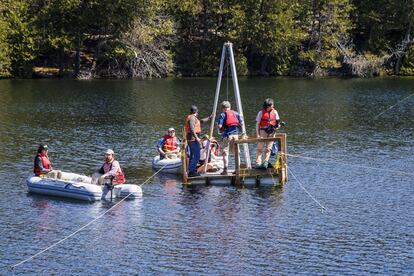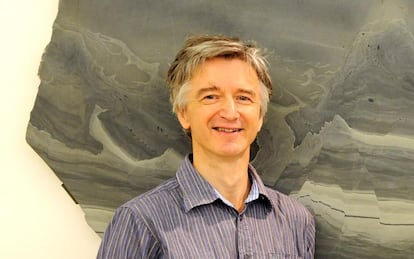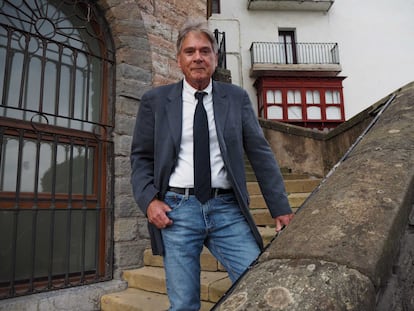The Anthropocene war: The controversial vote that decided not to change the planet’s geological epoch
A panel of experts voted down a proposal to officially label the human age as a newly created era to reflect our impact on the planet. The president of the committee denounces ‘serious violations’ of the rules

On February 1, 2024, a proposal to declare the start of the Anthropocene was voted upon. A panel of approximately two dozen international experts were asked to decide whether the planet had officially entered a new geological epoch in the middle of last century, characterized by severe human pollution that will be evident in future excavations, including radioactive isotopes from atomic bombs, microplastics, pesticides and industrial ash from coal and oil combustion.
The Anthropocene concept has already been established in popular culture and is even being used as a warning flag by environmental organizations, but 12 experts voted against making the new epoch official and only four voted in favor, with two abstentions and three neither voting nor abstaining. EL PAÍS has spoken to a dozen of the specialists involved and has had access to documents regarding a vote that has sent shockwaves around the world of geology.
In 1839, the British geologist Charles Lyell proposed the word Pleistocene to define the last prehistoric epoch, which included the last ice ages and began about 2.58 million years ago. In 1867, the French paleontologist Paul Gervais suggested calling the current chapter of the planet’s history the Holocene, which began over 10,000 years ago. In 2000, the Dutch chemist Paul Crutzen, winner of the Nobel Prize, declared that in his opinion the planet had already entered a new geological epoch, marked indelibly by the polluting impact of human beings: the Anthropocene. Even the Royal Spanish Academy declared the Holocene to be over and inaugurated the Anthropocene in its 2021 dictionary.
The current situation is unheard of. Jan Zalasiewicz, former head of the Anthropocene Working Group and current chair of the Subcommission on Quaternary Stratigraphy, has demanded the result of the vote be disregarded due to “serious violations” of the statutes. An Emeritus professor at the University of Leicester, UK, Zalasiewicz claims that he opposed the vote being held as the 12-year term of 11 of the 16 participating specialists had expired, losing them their right to vote, according to a report he signed that was seen by EL PAÍS.
The fierce battle over whether or not to relabel geological epochs is taking place within four groups of experts, one group working inside the other, like Russian dolls. The Anthropocene Working Group began investigating the idea back in 2009 and last October presented a 200-page proposal to declare the new epoch. This group is part of the Subcommission on Quaternary Stratigraphy, whose members are the ones who have now rejected the proposal by 12 votes to 4. This Subcommission, in turn, belongs to the International Commission on Stratigraphy, which could also reject the proposal while the final word will be had by the executive of the International Union of Geological Sciences (IUGS), which will meet on August 25 at a congress in Busan, South Korea.

Jan Zalasiewicz is one of the strongest proponents of recognizing the Anthropocene as a geological epoch. Last year, he won the Ig Nobel Prize, a humorous parody of the Swedish awards, for explaining geologists’ fascination for licking rocks. Zalasiewicz chaired the Anthropocene Working Group from its founding in 2009 until 2020, when he became head of the senior expert committee, the Subcommission on Quaternary Stratigraphy. The geologist alleges that the committee’s first vice-chair, Chinese scientist Liping Zhou, and secretary, Italian scientist Adele Bertini, organized the vote behind his back. Advocates of the Anthropocene as a geological epoch claim that they learned about the result in the press. Other members of the Subcommittee leaked the results on March 5 to The New York Times, which published them on its front page with the headline, Are We in the ‘Anthropocene,’ the Human Age? Nope, Scientists Say.
The general secretary of the IUGS, Stan Finney, who is from California but lives six months of the year in Aranjuez, in Spain’s Madrid region, with his Spanish wife, denies there were any “serious violations” of the statutes, as reported by Zalasiewicz and his second vice-president, the Canadian Martin Head. Finney suggests that the allegation is simply a ruse to avoid accepting the result. Head himself has been there for more than 12 years and was therefore unable to vote, Finney insists. “The time to address this issue was in 2020, when Zalasiewicz began his term as chair of the Subcommission on Quaternary Stratigraphy, not three years later and after losing a vote,” he adds. “If there has been negligence, it is his responsibility.”
But Zalasiewicz and his colleagues are not about to give up. A couple of months ago, they reported the alleged malpractices of their rivals to the IUGS Commission on Geoethics, which issued a report on January 19. Zalasiewicz claims that the commission ruled that the Anthropocene Working Group had been treated unfairly, subjected to illogical requests with not enough time to rebut objections. “[The Geoethics Commission] recommended the urgent suspension of any voting procedure,” Zalasiewicz states in his report. However, the IUGS executive, headed by Britain’s John Ludden, decided to go ahead with the vote, according to sources consulted by EL PAÍS.
The only Spanish member of the Anthropocene Working Group, the geologist Alejandro Cearreta, makes no attempt to hide his disappointment with the result. “The criticisms and attacks on the concept of the Anthropocene and the activity of the group have been numerous and have been changing over time, in a process similar to what has been happening with climate change and the IPCC [the group of experts of the United Nations]: denial and dragging their feet,” says Cearreta, a professor of paleontology at the University of the Basque Country. Cearreta bemoans the lack of time given to present the proposal, given the unforeseen circumstances of the Covid pandemic. For years, however, the IUGS has been criticizing the alleged slowness of the Anthropocene Working Group and its alleged strategy of publishing “a multitude of press releases” instead of a scientific proposal.

Stan Finney believes that the proposal to declare the Anthropocene as the new geological epoch has helped to “raise awareness of the immense and growing impact of humans,” on the planet with a message that has resonated not only with scientists, but also with artists and the general public. However, the creation of a new geological epoch is required to meet rigorous criteria and would have to be defined in a particular way to meet the needs of geologists. Finney and other colleagues proposed in 2022 “a practical solution”: not to consider the Anthropocene as an epoch, but as a geological event, like other great transformations of our planet, such as the Great Oxidation when microbes began emitting oxygen 2.4 billion years ago and changed the face of the Earth.
According to Finney, “The community, not just geologists, already sees the Anthropocene this way, but the Anthropocene Working Group is stuck in their outdated dogma. And, as they have done in their 15 years of existence, they attack everyone who does not accept the dogma.” On June 1, 2023, Jan Zalasiewicz, Alejandro Cearreta and other colleagues published their scientific arguments for declaring the Anthropocene a geological epoch rather than an event.
Committee member and geologist Jan Piotrowski from Copenhagen’s Aarhus University was among those who voted against the proposal. “It was a legal vote, carried out by a group of people representing the Subcommission on Quaternary Stratigraphy,” he says. “The voting process, including the census of voting members, had not previously been challenged. In my opinion, the result is binding.”
Piotrowski stresses that the 12 experts who voted down the proposal do not question the validity of the Anthropocene as a geological term. “We all agree that there is an overwhelming impact of humans on the planet,” he says. “What we are suggesting is that it is a geological event.” Piotrowski does add, however, that this is not the definitive dénouement of the Anthropocene as an epochal candidate. “With the nomenclatures of geologic time, nothing is written in stone,” he says. “It may be that, in time, new ideas emerge that cause the Anthropocene to be reconsidered. The issue is open-ended.”
Sign up for our weekly newsletter to get more English-language news coverage from EL PAÍS USA Edition
Tu suscripción se está usando en otro dispositivo
¿Quieres añadir otro usuario a tu suscripción?
Si continúas leyendo en este dispositivo, no se podrá leer en el otro.
FlechaTu suscripción se está usando en otro dispositivo y solo puedes acceder a EL PAÍS desde un dispositivo a la vez.
Si quieres compartir tu cuenta, cambia tu suscripción a la modalidad Premium, así podrás añadir otro usuario. Cada uno accederá con su propia cuenta de email, lo que os permitirá personalizar vuestra experiencia en EL PAÍS.
¿Tienes una suscripción de empresa? Accede aquí para contratar más cuentas.
En el caso de no saber quién está usando tu cuenta, te recomendamos cambiar tu contraseña aquí.
Si decides continuar compartiendo tu cuenta, este mensaje se mostrará en tu dispositivo y en el de la otra persona que está usando tu cuenta de forma indefinida, afectando a tu experiencia de lectura. Puedes consultar aquí los términos y condiciones de la suscripción digital.









































